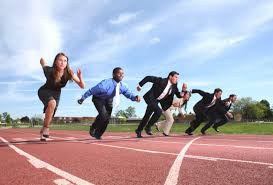
Written by Grant Parr
When Tiger Woods thrilled the sports world by winning The Masters golf tournament, many golf experts and fans viewed his triumph as inspirational.
After all, the 43-year-old Woods demonstrated not just athletic skills, but also mental strength that allowed him to overcome declining physical prowess and years of adversity that included a sex scandal, divorce and numerous back and knee surgeries.
For high-performing athletes, that’s not so unusual because mental attitude is often critical to success in sports. But the same can be true in the workplace for those willing to learn from the practices of athletes and apply them in their own lives, says Grant Parr (www.gameperformance.com), a mental sports performance coach and the author of The Next One Up Mindset: How To Prepare For The Unknown.
The key, Parr says, is to be prepared when big opportunities arrive – sometimes unexpectedly, as it did for Woods.
“Many of the demands we face at work are not so different than those faced by high-caliber athletes,” Parr says. “The need for mental toughness in the face of chaos and adversity is similar.
“But what happens when a big moment is at hand, like a promotion, and people aren’t ready for it? What did they not do to be properly prepared? The world is filled with unexpected opportunities for greatness, and there are processes that athletes and people in all types of positions can execute to get prepared for that moment.”
Parr focuses on five areas where athletic examples can be applied toward readiness and success in the workplace:
Applying grit in the face of adversity. “Handling adversity starts with being flexible,” Parr says. “Take difficult people you have to deal with; you must be able to adapt and adjust, know when to let things roll off your back and when to stand your ground. Or when you’ve missed your sales quota, you lose key people, etc., the stress can be enormous. These are times you have to rely on your inner warrior and draw on your past examples of strong mental performance.”
Turning crisis into opportunity. Some athletes are summoned to a bigger role because the performer in front of them is ineffective or hurt. “Can you see opportunity when everyone else sees uncertainty?” Parr asks. “When others react with fright, you can choose mental might.”
Embracing your role. Every team requires people who fulfill their roles. Part of embracing your role is recognizing that the team’s needs are bigger than your own. “Rock your role, and people will notice,” Parr says. “But keep aspiring, studying the practices of those in higher roles, and you’ll be fully prepared for advancement when it comes.”
Visualizing success. So critical to success in sports, visualizing success is just as vital in business. “See the performance as you wish it to go,” Parr says. “See yourself performing with energy and confidence; pump yourself up with positive talk.”
Assuming leadership. “Doing your best, showing enthusiasm and trustworthiness help establish a culture that lifts everyone up,” Parr says. ”Showing leadership when you don’t have a formal title allows you to develop the skills you’ll need when an opportunity arises and offers evidence you’re the one to fulfill that opportunity.”
“You may wait 10 or more years for a big opportunity, or it may come suddenly,” Parr says. “But if you’re not ready mentally, that opportunity will pass you by.”
About Grant Parr
Grant Parr (www.gameperformance.com) is a mental sports performance coach and the author of The Next One Up Mindset: How To Prepare For The Unknown. Parr owns and runs GAMEFACE PERFORMANCE, a consulting firm that enhances mental skills for athletes and coaches. A recruiter and sales leader in the corporate world for 17 years, he now works with a wide variety of athletes including Olympians, professionals, collegians and high school athletes. His podcast, 90% Mental, provides a window into a broad range of athletes’ and coaches’ mental games and shares their insights around mental performance.




